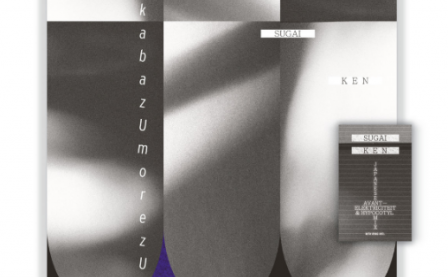I want to write this review in simple sentences. I want the review to make sense when translated by Google Translate. How will the sentences render? Will they fall apart? Will they become poetry or gibberish? Will the translation machine scramble their sense? Senseless spaces can welcome sensory moments. Moments of sensation. Sensational moments. Wondrous spaces. UkabazUmorezU explores wonder. Precise, imagistic moments suspend in a suspenseful balance. It is an eerie balance and a peculiar balance and sometimes a nonsensical balance. It is a collection of sensory sounds balanced by the distinct gibberish of silence.
Sugai Ken describes his style as one that “conjures [the] subtle and profound ambience of night in Japan.” Many ambient compositions offer broad soundscapes that resist boundaries and contouring. UkabazUmorezU’s ambience is more particular, insular, imaginary, and full of contours shaped by those moments and the spaces between them. The spaces are full of reflective silence, but they are also full of echoes, vestigial reverberations, accumulative delays, and surprises. Long ago, the songs fell apart, or were broken, like a geode. The pieces were left, undisturbed, as they lay. The shards of a shattered crystal catch many reflections. Glints shift as the sky turns around the moon, as clouds dissipate, as the hands of the clock tick, as cars with their bright headlights drive by, as owls hop through branches and stir the trees.
Many of these reflections feel shy and endearingly uncertain, like the opener “Wakihi” and later “Shinobine” and “Doujiri” and “Kugutsu Biwa.” The sounds do not want to disturb the silence that holds them. Many of the brief moments presented here feel as symbolic as words. The songs articulate an emergent language, a whispered oral history, a broken dictionary read from at night. A bedtime story told to the monster under the bed.
I am in the countryside in upstate New York. At night, I go for a walk down a dark path. I see a creature coming towards me on the path. It might be a possum. I imagine it is a large rat. When it sees me, it runs into the high grasses that line either side of the path. When I see it, I also want to turn around and run away. But it runs away first. I hear it crunching around in the grass. I fear it might return to the path. I turn around and hurry back. I am not sure what the creature is, and I am afraid of what it may be. My imagination explodes with potential scenes, like the ones I picture when listening to the gutturalisms of “Ganoubyoshi.” The next day, in daylight, I see a black cat stalking the line of the grass.
Nighttime is imaginative. Nights crafted by imagination can be heard throughout UkabazUmorezU. But, there are also nights spent on the computer, alone, trying to piece together all of the parts of one’s life in that machine. There are nights spent tossing and turning in bed. Nights spent out, with friends, among strangers. Tender instances. Dark moments. Confusing things. Excitements. Almost danceable bits. There are many nights spent with an ear pressed to a slippery window.
Shadows of swaying branches flicker against the curtains. The sounds of UkabazUmorezU flicker in fluttering arrangements like the hundred blinking eyes of Argus. Sugai Ken’s eyes blink open and closed on the huge head of UkabazUmorezU. The eyes are all different colors, sizes, and shapes, and they open and close for different lengths of time. Blinking is a language. “UkabazUmorezU” is a neologism that RVNG Intl. explains “roughly translates to “slow and steady wins the race.” ”UkabazUmorezU” is translated as “不浮不埋.” Rough translations. Interpretive listenings. The metamorphoses. In “Okera,” I hear a voice caw “Yooo hooooo.” In “Sawariyanagi,” I hear a voice say “Coin coin coin coin money money money money” in English. How funny.
More about: Sugai Ken




